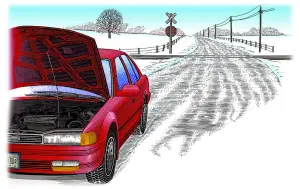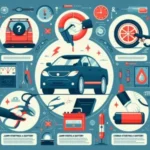A car can stall while driving for a variety of reasons.
Some common reasons causing your car to stall include:

- Fuel issues: If the car is not getting enough fuel, it can stall. This can be caused by a clogged fuel filter or a malfunctioning fuel pump. It can also be a problem with the fuel injection system.
- Ignition problems: If the car’s ignition system is not working properly, it can stall. This can be caused by a faulty spark plug or a bad ignition coil. A problem with the distributor cap or rotor can also cause ignition problems
- Air intake problems: If there is a problem with the air intake system, such as a clogged air filter or a vacuum leak, it can be a cause of a car stalling.
- Cooling system issues: If the car is overheating, it can stall. This can be caused by a malfunctioning radiator, a leak in the cooling system, or a problem with the water pump.
- Transmission issues: If there is a problem with the transmission, such as a slipping clutch or a faulty transmission sensor, it can cause the car to stall.
- Electrical problems: Electrical problems can cause the car to stall while driving. This can be caused by a faulty battery, a corroded battery terminal, or a malfunctioning alternator.
- Sensor issues: A faulty sensor can cause the car to stall while driving. This can be caused by a malfunctioning camshaft position sensor, a faulty crankshaft position sensor, or a malfunctioning throttle position sensor.
- Mechanical issues: Mechanical issues can cause the car to stall while driving. This can be caused by a worn out timing belt, a malfunctioning valve, or a damaged cylinder head.
Address those issues as soon as possible
It’s important to address any stalling issues as soon as possible, as they can be symptoms of larger problems that can cause damage to the engine or other parts of the car.
Always have your vehicle inspected by a professional mechanic if you are experiencing stalling issues.






